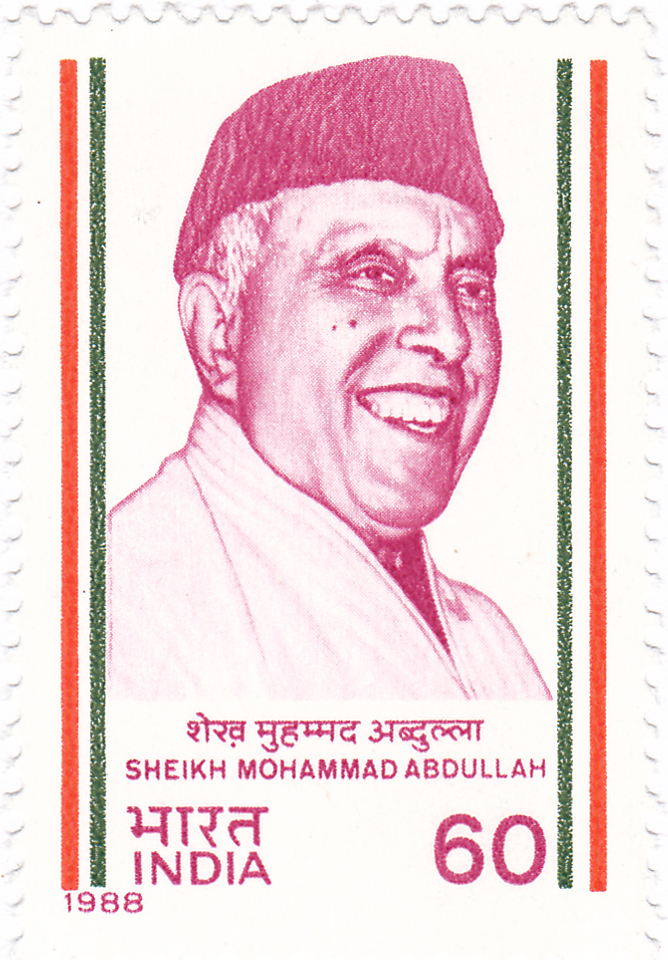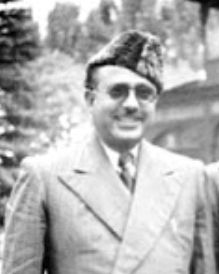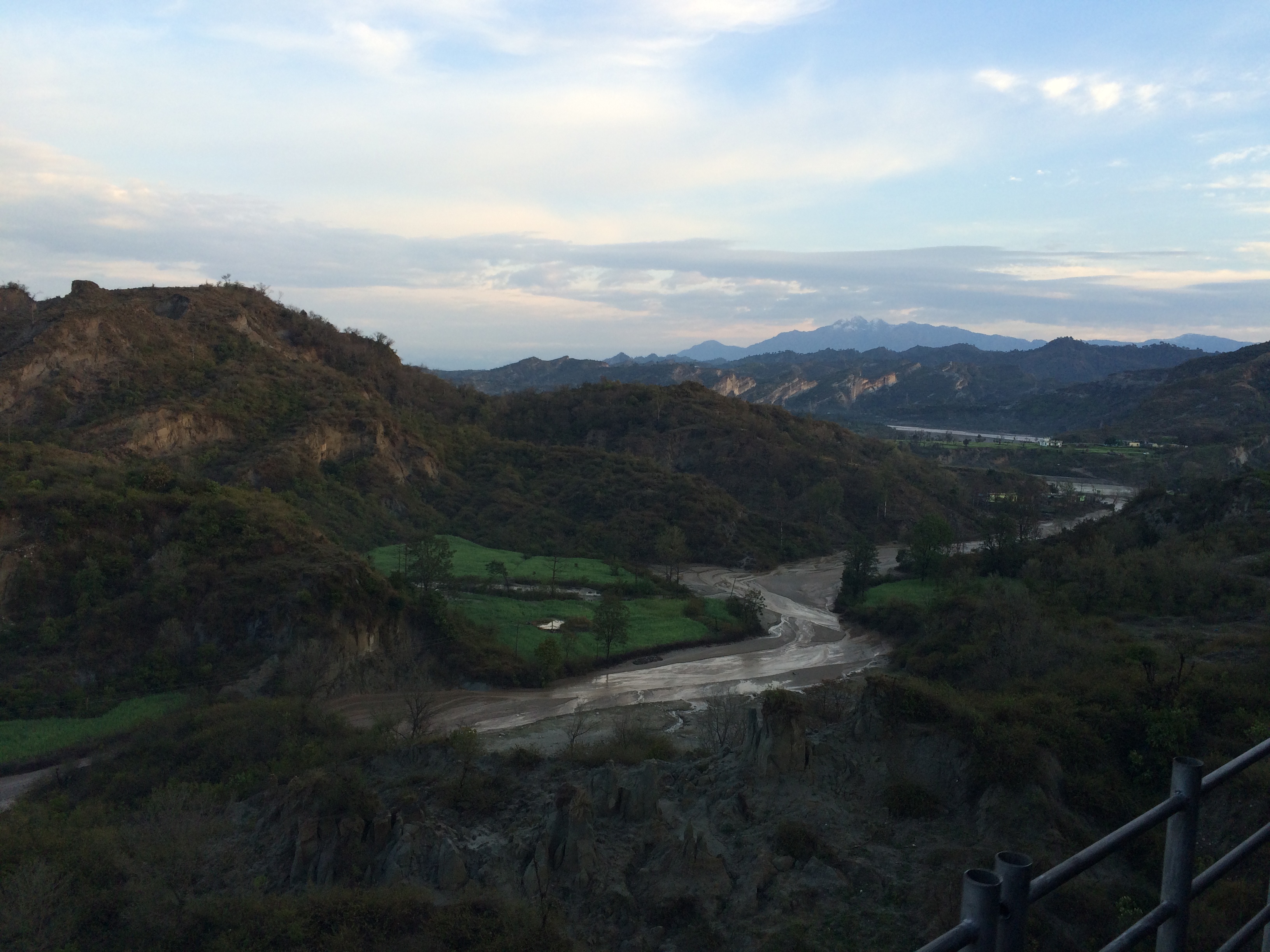|
Khwaja Shams-ud-Din
Khwaja Shams-ud-Din (1922 – 19 April 1999) was the Prime Minister of Jammu and Kashmir for a brief period of time from 12 October 1963 to 29 February 1964. He was first elected to the Legislative Assembly in 1956 and re-elected in 1962, 1967 and 1972. It was during his administration, on 26 December 1963, that the Prophet's Relic was stolen from the Hazratbal Shrine. Weeks after that incident, he was replaced by Ghulam Mohammed Sadiq __NOTOC__ Ghulam Mohammed Sadiq (1912 – 1971) was an Indian politician, who served as the Prime Minister of Jammu and Kashmir from 1964 to 1965, when the position was renamed to Chief Minister. He continued as the Chief Minister till his .... References 1922 births 1999 deaths Kashmiri people Chief Ministers of Jammu and Kashmir Jammu & Kashmir National Conference politicians Chief ministers from Jammu & Kashmir National Conference {{JammuKashmir-politician-stub ... [...More Info...] [...Related Items...] OR: [Wikipedia] [Google] [Baidu] |
Prime Minister Of Jammu And Kashmir
The Chief Minister of Jammu and Kashmir was the title given to the head of government of Jammu and Kashmir. As per the Constitution of India, the Lieutenant Governor is the state's ''de jure'' head, but ''de facto'' executive authority rests with the chief minister. Following elections to the Jammu and Kashmir Legislative Assembly, the Lieutenant Governor usually invites the party (or coalition) with a majority of seats to form the government. The Lieutent Governor appoints the chief minister, whose council of ministers are collectively responsible to the assembly. The post was established after the 6th amendment to the state's constitution (effective 6 June 1965) abolished the title of ''Prime Minister of Jammu and Kashmir''. Subsequently, the ruling prime minister, Ghulam Mohammed Sadiq, was sworn in as the first Chief Minister of Jammu and Kashmir. The State of Jammu and Kashmir was reorganised into a union territory on 31 October 2019. The office of Chief Minister of Ja ... [...More Info...] [...Related Items...] OR: [Wikipedia] [Google] [Baidu] |
Karan Singh
Karan Singh (born 9 March 1931) is an Indian politician and philosopher. He is the son of the last ruling Maharaja of the princely state of Jammu and Kashmir, Sir Hari Singh. He was the prince regent of Jammu and Kashmir until 1952. From 1952 to 1965 he was the ''Sadr-i-Riyasat'' (President) of the state of Jammu and Kashmir in the Republic of India. He is the chairperson trustee of the Dharmarth Trust of Jammu and Kashmir which maintains 175 temples in north India and works in other areas such as historical preservation. Singh was a member of India's Upper House of Parliament, the Rajya Sabha, representing the national capital territory of Delhi. He is a senior member of the Indian National Congress party who served successively as President (''Sadr-i-Riyasat'') and Governor of the former state of Jammu and Kashmir. He was a life trustee and president of India International Center. He was elected chancellor of Banaras Hindu University for three terms until 2018 when he w ... [...More Info...] [...Related Items...] OR: [Wikipedia] [Google] [Baidu] |
Bakshi Ghulam Mohammad
Bakshi Ghulam Mohammad (1907–1972) was an Indian politician belonging to the Jammu & Kashmir National Conference, who served as the Prime Minister of Jammu and Kashmir from 1953 to 1964. Bakshi was a member of the National Conference from its founding and rose to be the second in command to the principal leader Sheikh Abdullah. He served as the Deputy Prime Minister of the State of Jammu and Kashmir between 1947 and 1953, but disagreed with Abdullah's advocacy of independence for the state in 1953. He staged a 'coup' with the help of the Head of State Karan Singh, resulting in the dismissal and imprisonment of Sheikh Abdullah. Bakshi was the longest serving Prime Minister of Jammu and Kashmir, whose rule saw the formulation of the Constitution of Jammu and Kashmir and a normalisation of relations of Jammu and Kashmir with the Indian government. Early life Bakshi Ghulam Mohammed was born in 1907 in the princely state of Jammu and Kashmir. He was educated at C.M.S Tyndale Bis ... [...More Info...] [...Related Items...] OR: [Wikipedia] [Google] [Baidu] |
Ghulam Mohammed Sadiq
__NOTOC__ Ghulam Mohammed Sadiq (1912 – 1971) was an Indian politician, who served as the Prime Minister of Jammu and Kashmir from 1964 to 1965, when the position was renamed to Chief Minister. He continued as the Chief Minister till his death in 1971. Education and career He was a graduate of Islamia College in Lahore and Aligarh Muslim University. He served in Sheikh Abdullah’s first cabinet from 1947 to 1953. and was the leader of the National Conference party from 1957 to 1961 after which he joined the Indian National Congress. He was elected the Prime Minister A prime minister, premier or chief of cabinet is the head of the cabinet and the leader of the ministers in the executive branch of government, often in a parliamentary or semi-presidential system. Under those systems, a prime minister is not ... of Jammu and Kashmir in 1964. He became the first chief minister of the state in 1965, when the J&K Constitution was amended (Sixth Constitution of J&K Ame ... [...More Info...] [...Related Items...] OR: [Wikipedia] [Google] [Baidu] |
Jammu & Kashmir National Conference
The Jammu & Kashmir National Conference (JKNC) is a regional political party in the Indian union territories of Jammu and Kashmir and Ladakh. Founded as the ''All Jammu and Kashmir Muslim Conference'' by Sheikh Abdullah and Chaudhry Ghulam Abbas in 1932 in the princely state of Jammu and Kashmir, the organisation renamed itself to "National Conference" in 1939 in order to represent all the people of the state. It supported the accession of the princely state to India in 1947. Prior to that, in 1941, a group led by Ghulam Abbas broke off from the National Conference and revived the old Muslim Conference. The revived Muslim Conference supported the accession of the princely state to Pakistan and led the movement for Azad Kashmir. Since 1947, the National Conference was in power in Jammu and Kashmir in one form or another till 2002, and again between 2009 and 2015. It implemented land reforms in the state, ensured the state's autonomy under the Article 370 of the Indian Const ... [...More Info...] [...Related Items...] OR: [Wikipedia] [Google] [Baidu] |
Hazratbal Shrine
The Hazratbal Shrine ( ks, ), popularly called Dargah Sharif ("the Holy Shrine"), is a Muslim shrine located in Hazratbal locality of Srinagar in Jammu and Kashmir, India. It contains a relic, ''Moi-e-Muqqadas'', which is widely believed to be the hair of the Islamic prophet Muhammad. It is situated on the northern bank of the Dal Lake in Srinagar, and is considered to be Kashmir's holiest Muslim shrine. The name of the shrine is a combination of the Arabic word ''hazrat'' () and the Kashmiri word ''bal'' (). History and present status Hazratbal Shrine was initially established by Inayat Begum, the daughter of Khwaja Nur-ud-Din Eshai and the custodian of the holy relic. The first building of the shrine was constructed in 17th century by Mughal subedar Sadiq Khan during the emperor Shah Jahan's reign. This was initially called Ishrat Jahan. The building was ordered to be converted into a prayer hall in 1634 by Shah Jahan. Construction of the present day structure was starte ... [...More Info...] [...Related Items...] OR: [Wikipedia] [Google] [Baidu] |
1922 Births
Nineteen or 19 may refer to: * 19 (number), the natural number following 18 and preceding 20 * one of the years 19 BC, AD 19, 1919, 2019 Films * ''19'' (film), a 2001 Japanese film * ''Nineteen'' (film), a 1987 science fiction film Music * 19 (band), a Japanese pop music duo Albums * ''19'' (Adele album), 2008 * ''19'', a 2003 album by Alsou * ''19'', a 2006 album by Evan Yo * ''19'', a 2018 album by MHD * ''19'', one half of the double album ''63/19'' by Kool A.D. * ''Number Nineteen'', a 1971 album by American jazz pianist Mal Waldron * ''XIX'' (EP), a 2019 EP by 1the9 Songs * "19" (song), a 1985 song by British musician Paul Hardcastle. * "Nineteen", a song by Bad4Good from the 1992 album '' Refugee'' * "Nineteen", a song by Karma to Burn from the 2001 album ''Almost Heathen''. * "Nineteen" (song), a 2007 song by American singer Billy Ray Cyrus. * "Nineteen", a song by Tegan and Sara from the 2007 album '' The Con''. * "XIX" (song), a 2014 song by Slipkn ... [...More Info...] [...Related Items...] OR: [Wikipedia] [Google] [Baidu] |
1999 Deaths
File:1999 Events Collage.png, From left, clockwise: The funeral procession of King Hussein of Jordan in Amman; the 1999 İzmit earthquake kills over 17,000 people in Turkey; the Columbine High School massacre, one of the first major school shootings in the United States; the Year 2000 problem ("Y2K"), perceived as a major concern in the lead-up to the year 2000; the Millennium Dome opens in London; online music downloading platform Napster is launched, soon a source of online piracy; NASA loses both the Mars Climate Orbiter and the Mars Polar Lander; a destroyed T-55 tank near Prizren during the Kosovo War., 300x300px, thumb rect 0 0 200 200 Death and state funeral of King Hussein rect 200 0 400 200 1999 İzmit earthquake rect 400 0 600 200 Columbine High School massacre rect 0 200 300 400 Kosovo War rect 300 200 600 400 Year 2000 problem rect 0 400 200 600 Mars Climate Orbiter rect 200 400 400 600 Napster rect 400 400 600 600 Millennium Dome 1999 was designated as the ... [...More Info...] [...Related Items...] OR: [Wikipedia] [Google] [Baidu] |
Kashmiri People
Kashmiris are an Indo-Aryan ethnolinguistic group speaking the Kashmiri language, living mostly, but not exclusively, in the Kashmir Valley of Jammu and Kashmir, India.(a) (subscription required) Quote: "Kashmir, region of the northwestern Indian subcontinent ... has been the subject of dispute between India and Pakistan since the partition of the Indian subcontinent in 1947. The northern and western portions are administered by Pakistan and comprise three areas: Azad Kashmir, Gilgit, and Baltistan, the last two being part of a territory called the Northern Areas. Administered by India are the southern and southeastern portions, which constitute the state of Jammu and Kashmir but are slated to be split into two union territories. China became active in the eastern area of Kashmir in the 1950s and has controlled the northeastern part of Ladakh (the easternmost portion of the region) since 1962."; (b) C. E Bosworth, University of Manchester Quote: "KASHMIR, kash'mer, the nort ... [...More Info...] [...Related Items...] OR: [Wikipedia] [Google] [Baidu] |
Chief Ministers Of Jammu And Kashmir
The Chief Minister of Jammu and Kashmir was the title given to the head of government of Jammu and Kashmir. As per the Constitution of India, the Lieutenant Governor is the state's ''de jure'' head, but ''de facto'' executive authority rests with the chief minister. Following elections to the Jammu and Kashmir Legislative Assembly, the Lieutenant Governor usually invites the party (or coalition) with a majority of seats to form the government. The Lieutent Governor appoints the chief minister, whose council of ministers are collectively responsible to the assembly. The post was established after the 6th amendment to the state's constitution (effective 6 June 1965) abolished the title of ''Prime Minister of Jammu and Kashmir''. Subsequently, the ruling prime minister, Ghulam Mohammed Sadiq, was sworn in as the first Chief Minister of Jammu and Kashmir. The State of Jammu and Kashmir was reorganised into a union territory on 31 October 2019. The office of Chief Minister of ... [...More Info...] [...Related Items...] OR: [Wikipedia] [Google] [Baidu] |
Jammu & Kashmir National Conference Politicians
Jammu is the winter capital of the Indian union territory of Jammu and Kashmir. It is the headquarters and the largest city in Jammu district of the union territory. Lying on the banks of the river Tawi, the city of Jammu, with an area of , is surrounded by the Himalayas in the north and the northern-plains in the south. Jammu is the second most populous city of the union territory. Three battles have been fought in the city: first by the founder Raja Mal Dev against Timur in Battle of Jammu (1399), second by Sardar Bhag Singh against Mughal army in Battle of Jammu (1712) and the third by Mian Dido & Maharaja Gulab Singh against Ranjit Singh's army in Battle of Jammu (1808). Known as the ''City of Temples'' for its ancient temples and Hindu shrines, Jammu is the most visited place in the union territory. Jammu city shares its borders with the neighbouring Samba district. Etymology According to local tradition, Jammu is named after its founder, Raja Jambulochan, who is ... [...More Info...] [...Related Items...] OR: [Wikipedia] [Google] [Baidu] |





